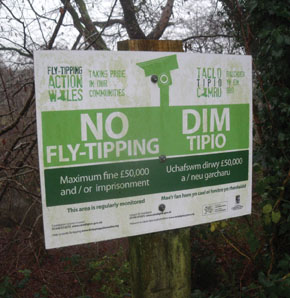Criminals who dump waste and fly-tip need to be punished more to deter them, says the Local Government Association. The LGA points to an almost 40 per cent rise in fly-tipping incidents since 2012: up by 39.6 per cent, up from 714,637 to 997,553 in 2017/18.
Councils have the power to issue fixed penalty notices for smaller instances of fly-tipping and can and do take worse offenders to court, under the Waste (England and Wales) (Amendment) Regulations 2014. The LGA says that demand on councils’ legal duties, such as caring for elderly and disabled people, protecting children and providing homelessness support means less money is available for discretionary powers – like issuing fines for fly-tipping. The LGA argues that council enforcement cannot keep up with spiralling cases of fly-tipping. Councils took action on 494,034 incidents in 2017/18 – up by nearly 70,000 in five years.
The LGA is calling for the Government to review guidance to the courts, and for the central government Spending Review to ensure councils have the funding needed to investigate and prosecute fly-tippers.
Martin Tett, Chairman of the LGA’s Environment Board, said: “Fly-tipping is unsightly, unacceptable and inexcusable environmental vandalism. Councils are doing everything they can to try and deter fly-tippers. However, prosecuting them often requires time-consuming and laborious investigations, with a high threshold of proof, at a time when councils face significant budget pressures. Consistent and hard-hitting prosecutions are needed to deter rogue operators and fly-tippers. Councils also need adequate funding to investigate incidents and ensure fly-tippers do not go unpunished.”
The stats gathered by Defra show that highways have consistently been the most common land type for fly-tipping incidents; but there’s also fly-tipping on council land, alleyways and ‘footpaths and bridleways’. As for type, while it’s typically ‘black bags’ of household waste, it’s also commercial – ‘construction, demolition and excavation’; other unidentified; white goods; green waste; other electrical; tyres; vehicles parts; animal carcasses; chemical drums, oil and fuel; clinical; and asbestos.
Picture by Mark Rowe; anti-fly-tipping sign in English and Welsh, near Aberystwyth.









